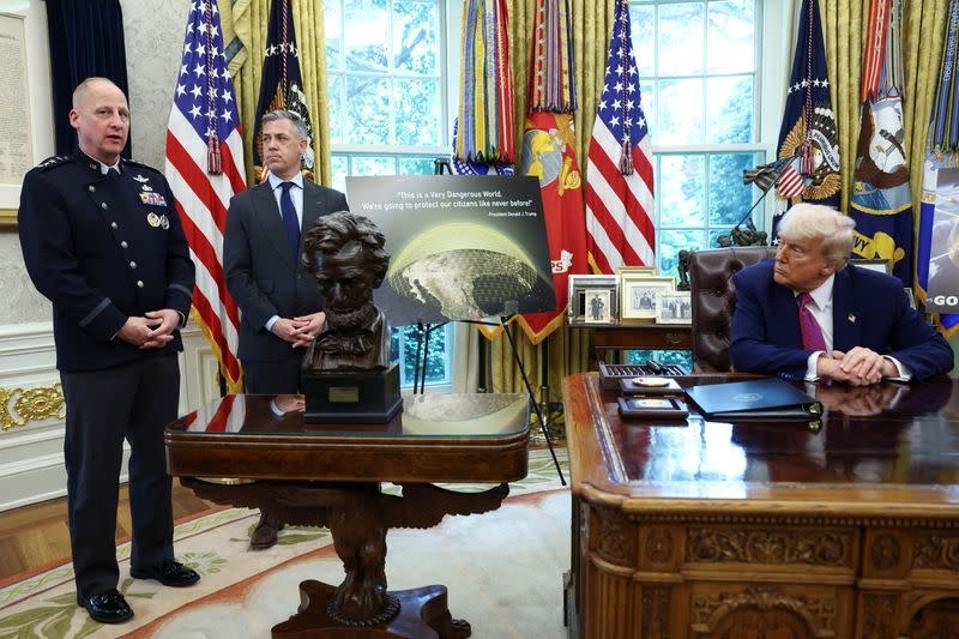The dimensions of modern warfare have shifted so suddenly and in such a way that even our country’s newest service is neither preparing for nor even really thinking much about. Today’s battles are defined as much by interconnected networks and the software-driven systems on them as by the kinetic effects of traditional weapons.
Futurists a generation ago envisioned a network-centric battlefield, but few could have predicted the sophistication of today’s adversaries or the complexity of the digital tactics they now employ. What was once academic theory is now battlefield reality and will determine the fate of not just a battle but the survivability of empires. To maintain superiority, the United States Space Force has no choice but to prioritize the development and integration of artificial intelligence (AI) as a core warfighting capability.
AI is poised to transform warfare as profoundly as aviation was in the early decades of the 20th century. The Brookings Institution already finds that Generative AI is revolutionizing industries at a breadth and pace unseen since the Industrial Revolution, while more autonomous technologies are accelerating the determination of winners and losers from agriculture to transportation. The next stop is agentic AI: autonomous software systems capable of learning and operating independently. In military terms, these AI agents function as cyber warriors, battling for control in the digital realm. And while this might all sound madly futuristic, our adversaries are already developing, deploying, and testing such capabilities.
The Space Force, the first digital service and one defined by software more than anything else, must conceive, develop, deploy, and command these AI agents across its entire space systems architecture, end-to-end. These agents must be integrated into every mission system tasked with combat force employment because only they, and the Guardian warriors who operate them, will differentiate our Space Force from any other. The successful deployment and operation of these weapons is the order of battle, and our leaders must ensure positive control over operations and the evolution of their capability.
This challenge is uniquely acute for the Space Force. Unlike other military branches, it is inherently digital in its nature. Its future victories will depend more on mastering data science and AI-driven operations and far less on rocket science. Just as air superiority was essential to American dominance in the 20th century, space superiority, assured by occupying orbits and enabled by AI agents, will be essential for America in this century. Yet, while our adversaries surge ahead, the Pentagon remains restrained by decision-making processes conceived in the 1960s and barely updated since the 1990s.
The Department of Defense’s bureaucratic inertia is ill-suited to the demands of real-time, adaptive AI warfare. There are rumors on Capitol Hill that rather than redesigning these processes to suit a new era, in a fit of panic some senior decisionmakers are actually considering avoiding it all by just leasing services for core space warfighting missions. Doing so for communications and missile warning would be catastrophic and certain to ensure warfighting commanders have neither command nor control of their assigned forces for today and the future. Abrogating to corporate digital mercenaries at a time when competitors like China are aggressively investing in AI agents to gain an edge in network-centric warfare will mean certain defeat. By accommodating the inherited dysfunctions of the past instead of adopting the processes needed to win, the U.S. Space Force risks echoing France’s misplaced confidence in 1939, relying on a Maginot Line built for the last war, only to be swiftly outmaneuvered by more agile adversaries.
To control is to own and for that reason all mission critical systems must remain government owned. While ownership is more cost-effective for taxpayers than renting, the case for owning these systems goes beyond fiscal prudence, it’s a strategic imperative. Ownership ensures the Space Force always defines what these systems can do, how they evolve, and how they respond to threats. In an era where software, AI algorithms, cloud and edge computing, and zero-trust architectures determine mission success, solely thinking about hardware is no longer sufficient. The ability to develop, deploy, and control bespoke AI capabilities will dictate who prevails in the next generation of space conflict.
To rise to this challenge, the Space Force must fully adopt a digital-first mindset. From initial Guardian training to strategic planning, software and AI tools must be viewed as foundational to every mission. If satellites are their rifles, then software stacks and AI agents are the ammunition bunkers that empower those weapons. Future Guardians must be as proficient in AI and data operations as today’s pilots are in aerodynamics. Mastering orbital dynamics and transfer orbits were what defined space superiority in the past, today this can be done on an iPhone. It’s only when a digital mindset becomes part of every Guardian’s DNA that the Space Force will be truly prepared for offensive, defensive, and combat support missions in, from, and to space.
If the Space Force proceeds with outsourcing its core missions with lease agreements and does not put AI at the forefront, we must all rethink what the Space Force is. Without direct control of the operations and future of these capabilities, the Space Force becomes little more than a team of contracting managers. Securing American interests in space begins with cultivating space-minded personnel, instilling a warrior ethos, and having plans and procedures necessary for space superiority.
Failing to own and control its future will indicate willful ignorance of this fundamental shift in the nature of warfare; both in space and enabled by space. And without decisive action by Congress, today’s space leaders will find their successors standing proudly atop their own Maginot Line, 100 years later, and just as irrelevant. For the Space Force and the Congress who resources it, the choice is clear: adapt and lead in AI-driven space operations, or risk irrelevance in the conflicts of tomorrow.

